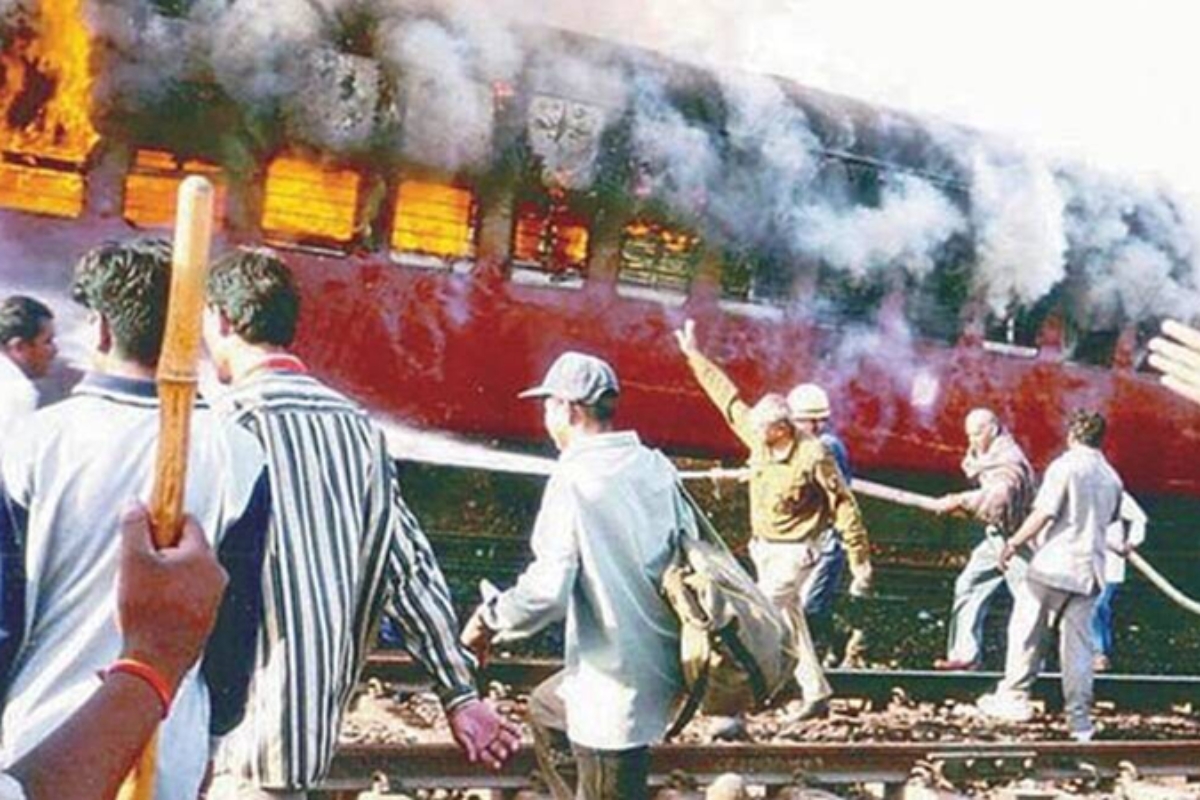In 2002, the Godhra train burning incident shocked the nation, and the ripples of that tragedy continue to shape our understanding of duty, responsibility, and the consequences of neglecting them. Recently, the Gujarat High Court upheld the dismissal of nine railway constables whose actions were deemed to have contributed to the tragic events.
The Fateful Decision
The story begins with nine railway constables who were assigned the crucial task of patrolling the Sabarmati Express, a train that was categorised as high-risk. The train, known for its vulnerability to untoward incidents, required armed security personnel aboard, in line with standard protocols. However, when the time came to board the train, these constables made a fateful decision. Instead of travelling on the Sabarmati Express, they chose to board the Shanti Express, even though the Sabarmati was delayed by just six hours. This seemingly minor delay set the stage for a tragic outcome.

The absence of police personnel aboard the Sabarmati Express left the passengers, including those on the infamous S-6 coach, unprotected when the train was attacked at Godhra. The lack of armed security made the train even more vulnerable, and as a result, the horrific tragedy unfolded. This negligence became the focal point of the case that later reached the Gujarat High Court.
Gujarat High Court Strong Remarks on Dereliction of Duty
The case was brought before the Gujarat High Court after the constables were dismissed following a departmental inquiry. The petitioners challenged their dismissal, claiming that the punishment was too severe for the charges against them. They argued that they had not been informed of any specific threats to the Sabarmati Express and even accused the inquiry officer of bias. One of the constables even made the argument that had they boarded the Sabarmati Express, they could have lost their lives and become martyrs. This, however, was dismissed by the court as irrelevant.
Justice Vaibhavi D. Nanavati, who presided over the case, firmly rejected the petitioners’ arguments. She pointed out that it was undisputed that the constables had been assigned to travel on the Sabarmati Express, yet they deliberately chose not to. The judge stressed that had they adhered to their duty, the tragedy could have been prevented. In her words, “If the petitioners had departed in the Sabarmati Express train itself to reach Ahmedabad, the incident that occurred at Godhra could have been prevented.”
The court also criticised the constables for falsifying their travel records and neglecting their responsibilities, labelling their actions as “gross negligence” and “carelessness.” The Sabarmati Express, being categorised as a high-risk train, required armed personnel for its security, and the absence of such personnel directly contributed to the vulnerability of the passengers during the Godhra incident. Justice Nanavati strongly remarked, “The passengers were without any police personnel on such a sensitive train.
The Gujarat High Court Final Verdict
Despite the petitioners’ protests and claims of unfair treatment, the Gujarat High Court upheld the dismissal. The court agreed with the earlier decisions made by the departmental, appellate, and revisional authorities. It concluded that the punishment of dismissal was not only appropriate but necessary given the severity of the misconduct. The court also noted that there was no evidence to support the allegations of bias, and the claim of potential martyrdom was dismissed as irrelevant to the case at hand.
Justice Nanavati reinforced that the constables’ actions had put the lives of innocent passengers at risk. Their failure to carry out their duties as mandated had consequences far beyond their own lives. In a position where trust and duty were paramount, they had failed to act responsibly, and as a result, their punishment was justified.
A Reflection on Accountability and Responsibility
This case is not just about the fate of nine constables, but also about the larger lesson it imparts on accountability. The tragedy at Godhra could have been prevented if those entrusted with the security of the passengers had not failed in their duty. Their neglect highlights the importance of following orders, being vigilant, and the devastating consequences that can follow when responsibility is taken lightly.

The judgment serves as a stern reminder to all of us about the importance of fulfilling our duties with integrity and dedication, especially when the safety and lives of others are at stake. It is not just about doing a job, but about ensuring that we do it with care, attention, and a sense of responsibility.
Disclaimer: The views and opinions expressed in this article are based on the Gujarat High Court judgment and are intended for informational purposes only. This article does not seek to provide legal advice or guidance. The author holds no responsibility for any actions taken based on the information provided here. Please consult a legal expert for professional advice on legal matters.
Also Read:
Delayed But Not Denied: Supreme Court Revives Claims Under Limitation Law
Uniform Civil Code is Not Just Law, It’s Humanity, Says Karnataka HC
Supreme Court Slams Overpriced Lawyers: Justice Must Be Accessible to All






